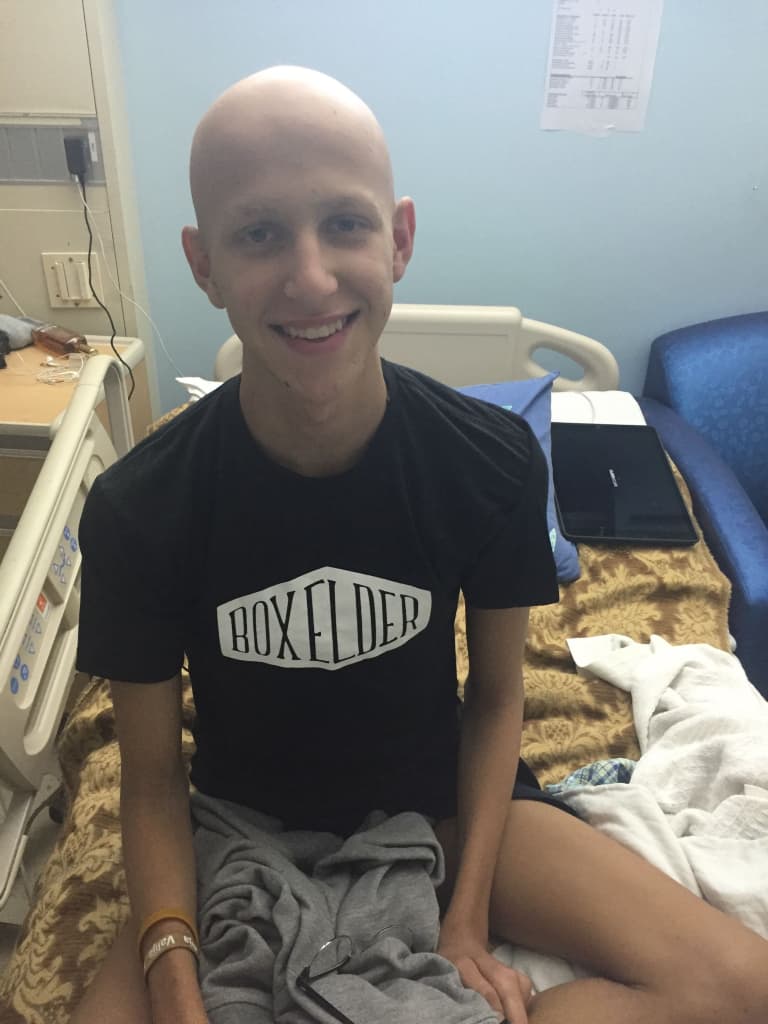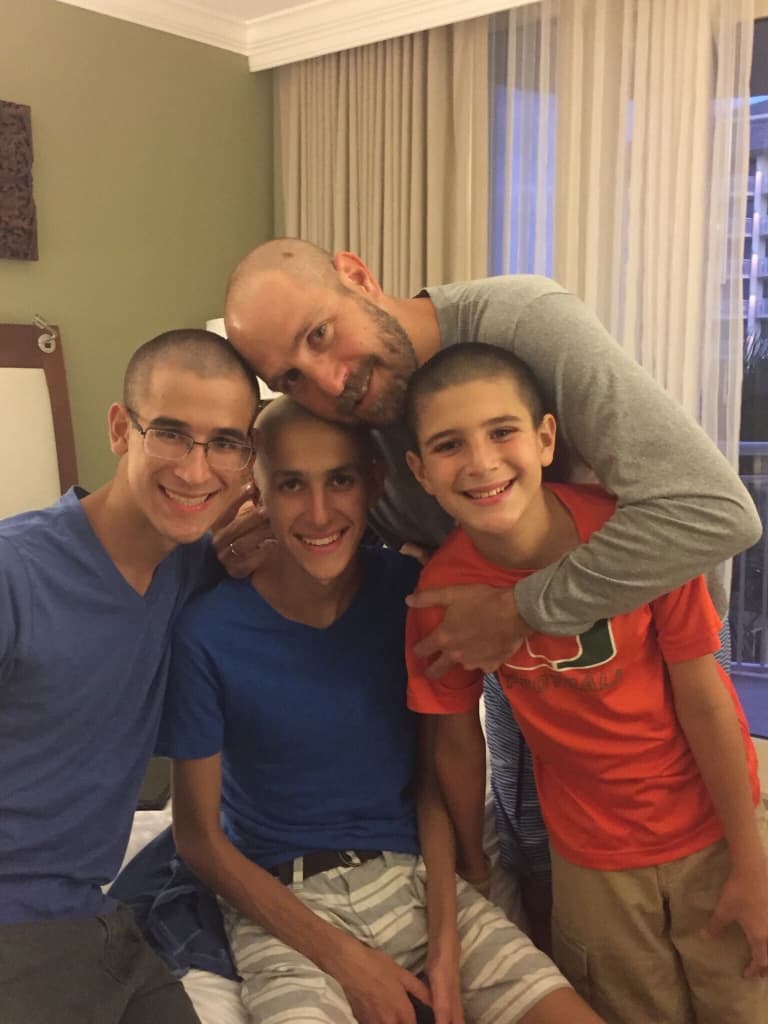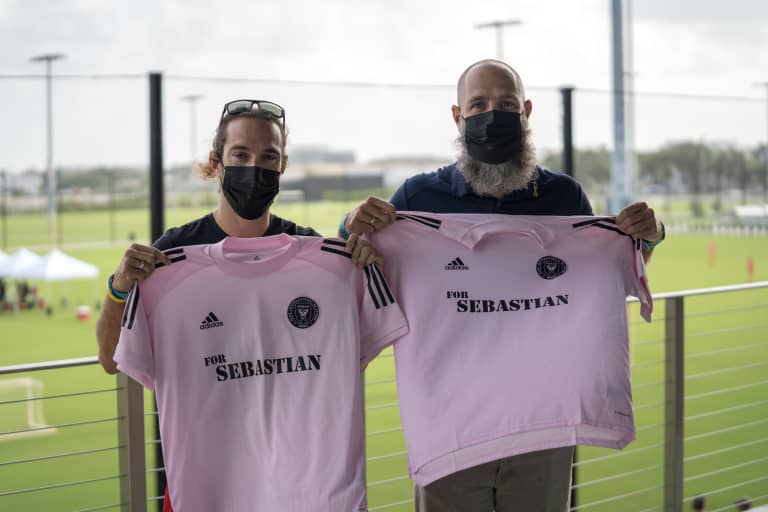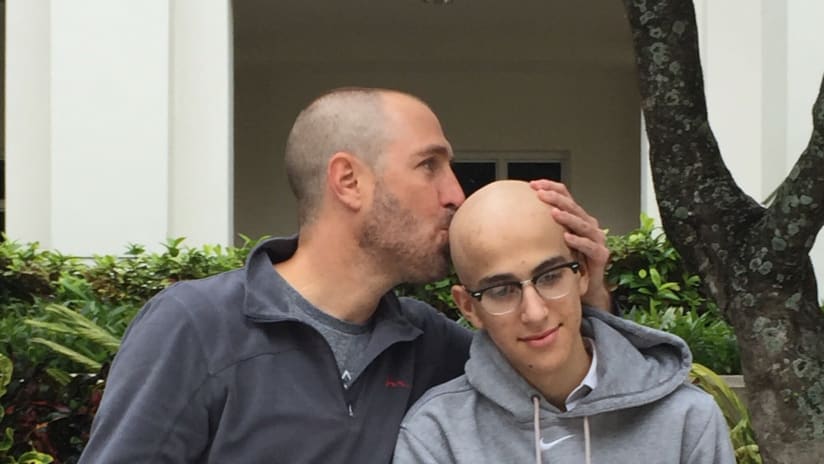EDITOR'S NOTE: As part of Childhood Cancer Awareness Month, MLS WORKS — Major League Soccer’s social responsibility platform — is teaming up with league partner Continental Tire to raise awareness and funds in the battle against childhood cancer. And you can play your part. In honor of MLS's 25th season, Continental Tire will donate $25 to fund pediatric cancer research for every message of hope posted on Twitter using the hashtag #KickChildhoodCancer.
Before their match with Nashville earlier this month, Inter Miami trained in shirts that eschewed the normal sponsorship logos in favor of a simple message: “For Sebastian.” The shirts were then signed and they are currently being actioned off, with the money going to childhood cancer research. But it's not only raising money for the cause, it's raising awareness.
These words don’t exist without “For Sebastian.” But “For Sebastian” only matters if you know who it's all about.
Sebastian Ortiz is more than his cancer story. It is only a fraction of his life. But Sebastian’s cancer story matters because it’s not only his cancer story, it’s also his family’s. His friends’. His two brothers’. His mom’s. His dad’s. And it’s part of their story to make sure there are fewer stories like his and theirs.

The Inter Miami squad poses for a photo with their "For Sebastian" practice jerseys.
Sebastian's story
In October of 2015, Sebastian felt a mass. Sebastian, 15 years old and a sophomore at Columbus High School, an all-boys prep school in Miami with an alumni list that includes not only the managing owner of Inter Miami but Sebastian’s dad and uncles, felt a mass. He went to his dad, Oscar, to ask questions. In situations where you don’t have the answers, all you can do is to respond with questions. “When did you feel it? Does it hurt?”
Two weeks later, it had grown. They set up a time with a pediatrician. 8 pm on Monday, Oct. 26. Just to check. As they sat in Miami traffic on their way to an after-hours appointment, Oscar wondered if they should just grab food instead and call it a night. It was probably nothing. A few moments later he had what he calls his first “Oh, s.” moment.
They went to the appointment. The pediatrician told them they needed to see a pediatric urologist. From there every next thing they were about to lose became the most painful. Time. Money. Comfort. Hair. Each thing consuming the next and circling back around.
The second “Oh, s” moment came hours later. Oscar got a call in the morning. The pediatrician wanted to make sure they were seeing the urologist. Each moment seemed to double the gravity of the situation. It floored Oscar. He realized that the pediatrician hadn’t quite keyed them into how serious this might be. Sebastian went to the urologist at Nicklaus Children’s Hospital that day.
They ran scans. Lots of scans. Eventually an ultrasound. And even without a medical background, Oscar could tell something didn’t look right. He started asking questions. “Why is that side so much more different?” “Why is that one so much more red?”
They tried their best to answer. Oscar worked in sales though. He could tell when someone was lying. “Oh s*” he thought.
Sebastian had a tumor. He would need surgery. They wanted to know if they could get a second opinion. Who wouldn’t? The doctor told them they could, but they couldn’t wait to do it. That’s a pretty convincing statement. He underwent surgery to remove the mass that day. Less than 24 hours after dinner had almost seemed more important than a check-up.
Three days later, the doctors confirmed that Sebastian had cancer. Rhabdomyosarcoma. Cancer that forms in soft tissue and makes up about seven to eight percent of childhood cancers.

“It's still hard to hear. Like, even when I say it, you hear those words, ‘Your son has cancer’ and then a whole world of things go through your head about what does this mean?” Oscar said. “You’re sort of knocked down and then you regroup and you say, OK, what am I going to do? What's the plan?’”
They talked to multiple hospitals. They talked to oncology groups. They talked to a parent whose child had a similar diagnosis. There was only one plan. Options for treating childhood cancer are limited. Sebastian would be undergoing the same protocol that had been in place for over 40 years. That protocol started with an invasive surgery with a long name that gets shortened to RPLND. It removes all the lymph nodes in the back of the abdomen that may contribute to the cancer spreading. It lasts seven hours and requires several days of recovery in the ICU.
The battle changes
Sebastian underwent RPLND in late November of 2015. They removed 13 lymph nodes. Four tested positive for cancer. He started six months of chemotherapy 10 days later, just a few days after leaving the ICU. The protocol called for 20 sessions of chemo and 23 sessions of radiation.
He lost weight. A lot of weight. Over 30 pounds. He began to experience numbness and pain in his hands and feet. He began to lose blood cells, which meant trips to the hospital for infusions. He’d ask not to go. He had to go.
In May, on his 16th birthday and his mom Rose’s 45th, he had his last chemo session. Three weeks of tests followed, just to be sure. Rhabdomyosarcoma spreads. It’s kind of like a rash. It spreads and then it builds. The initial tests didn’t show any large masses but showed some swelling. They kept testing and kept testing to see if there was any spread. Eventually, the doctors decided that to end the tests, they needed to do a biopsy.
“The surgeon came out mid-biopsy,” Oscar said. “We could see it in his face. He just gave the nod that there was spread and we … we kind of knew what that meant. We knew at that point the battle had changed.”
When the battle changes, you make a new plan.

Sebastian Ortiz with his father and siblings.
“Similar to the start of it, you regroup and you say, OK, this is it. I don't care about the likelihood or the percentage of successes anymore. If there's a 1% chance we're in for that 1%. That's sort of the mentality after you regroup,” Oscar said. “It took me probably a week to regroup and say, ‘F*. My kid may die. Alright, let's move, let's get back in game mode and let's ride this out and see what we're doing and attack, what do we need to do?’”
Sebastian needed to do 12 more rounds of chemo that included treatment with Doxorubicin, a drug known as “The Red Devil.” It’s administered over five days by medical professionals who have to wear personal protective equipment for a drug injected directly into the patient’s veins. If it’s accidentally injected into muscle it can cause severe damage. If injected properly, it can still cause serious heart problems. “Man,” Oscar thought. “We don’t have better than that?”
In all this, Sebastian didn’t stop being a 16-year-old. That meant he constantly bothered his parents about a car. Specifically, a special model Toyota Tacoma. There were only three even in the area. His dad told him to wait for January. He’d be done with chemo and taking part in a clinical trial then. Oscar wanted to be practical. He succeeded at that for a little while.
During Sebastian’s last week of chemo in October of 2016, a year after he first felt the mass, he peppered Oscar about the car. Oscar caved. He drove out an hour and a half away and shrugged off the dealer’s attempts to bump the price due to rarity with “Yeah, well my kid has cancer.” When Sebastian left his last treatment, the Tacoma sat waiting to surprise him.
“It was the most irresponsible purchase I've made in my life, but the best irresponsible purchase I'll ever make,” Oscar said.
After his last chemo session and his first car, Sebastian was scheduled for surgery four weeks later. He needed the four weeks to regain weight. He didn’t get four weeks.
Three weeks later, on election night that November, Oscar got a call from his wife in Miami. He had traveled to Chicago for work. He immediately headed home. Fluid had built up in Sebastian’s stomach causing it to swell. Sebastian went into surgery that morning.
“The surgeon came out shortly after starting, to tell us that the cancer had spread everywhere,” Oscar said.
“You’re not ready to hear that. And this is kind of, you know, quick, impromptu. So you have the conversation. OK. So what can you remove? And you start bargaining in terms of what can we do? What can we cut out? And he's saying, 'Look, this is not about having a colostomy bag or finding a tool beyond that. I can't remove everything. It's there. It's everywhere.' And we kind of knew what that meant.”
Sebastian recovered from the surgery in the ICU. In typical style, he tried to make everyone else feel better. He smiled and kept telling the people around him, “We got this.” Before he left the ICU, the doctors told Oscar there were no more curative options. Oscar made sure he was the one to tell Sebastian.
“They can do stuff that will make this go longer Sebs, but you're going to be stuck in a hospital. It's going to be highly toxic. It's not going to cure it. You don't have to do that for me. You don't have to do it for mom. You battled,” Oscar said.
Sebastian replied, “OK. We'll just wait for a miracle.”
Sebastian died at home on December 29, 2016, at 5:45 in the morning. Miracles come far too late, far too often.
"I work to honor him every day"
But before Sebastian died, he got to show his strength and share joy with his family one last time. After Oscar and Rose told Sebastian they didn’t have much time, it was Sebastian’s turn to make sure he delivered the news. One by one, he told his family members. He consoled them. He told them not to worry.
“He did that time and time again. He did it with the nurses who he got close to. One of them still tells this story of how she would watch him console people while he was on his deathbed,” Oscar said. “I aspire to be that normal. To have that much grace, not just in times of crisis like that, but aspire to be where you can say, 'OK, I’ve got this no matter what.' It was an amazing thing to watch him, and it’s a driver in my behavior and how I work to honor him every day. That's the standard I look to. It’s hard sometimes, but it gets my ass moving pretty quickly.”

Sebastian Ortiz's uncle Alex (left) and dad Oscar (right) pose with the "For Sebastian" Inter Miami training tops.
After Sebastian told the rest of his family, Christmas came. His Uncle Alex had news of a different kind. He and his wife were expecting twins. Alex told Oscar first. He cried when he did it. It seemed unfair. Oscar agreed. When you don’t have answers you ask questions. He asked God if his brother only wanted one, then why not give him one and let Oscar keep his?
But Oscar eventually told his brother to let Sebastian know. Even if he didn’t know how Sebastian would react, Oscar didn’t know how much time he had. Alex told him on Christmas morning. Sebastian’s eyes lit up.
“That’s so awesome, Tio,” Sebastian said. “Tell, Tia to come over, I want to congratulate her, too.”
In honor of Sebastian, Oscar and Rose started the SebastianStrong Foundation in 2017. The organization helps fund research for childhood cancer, helps those dealing with childhood cancer manage the extraordinary cost of treatment, and helps raise awareness of the lack of resources devoted to childhood cancer. Only 1% of new cancer cases annually are childhood cancer cases. That means funding and research is limited. But that doesn’t mean stories like Sebastian’s are any less painful.
“It doesn't get easier as a parent,” Oscar said. “I miss him as much today as I did day one. It's part of why we started the foundation. If I can help just one family at some point through time, if I can be part of something and if what our supporters do and the organization does as a collective could be part of something that leads to saving a child's life, then we have to do it.
“If I can save another family from feeling what I feel now, that doesn’t bring Sebastian back. But there’s some level of vindication, some level of … there's nothing that I wouldn't have done to have more time with my son. So if I can do that for somebody else, I don't think there's a greater way that I can honor him.”
This month is childhood cancer awareness month. MLS as a league is pushing initiatives to be a part of that. But when you see things like the yellow nets and hashtags it’s important to look past the company behind the efforts and remember who it’s really for. It’s for Sebastian. And every other person affected on an individual level by childhood cancer. If you take that knowledge and help as you can, you can help miracles come a little sooner and a little more often.
“For Sebastian” only matters if you let it.
Fans can purchase a limited number of "For Sebastian" training jerseys with 100 percent of proceeds going to pediatric cancer research. Contributions to the SebastianStrong Foundation can be made by visiting the organization's site.







